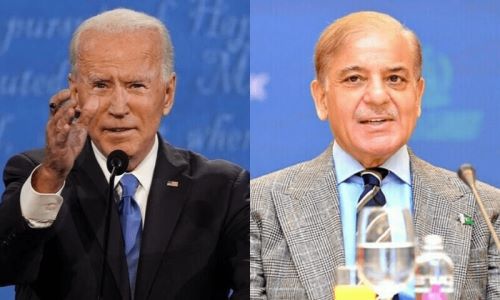Biden gesture to Shehbaz not extended to his predecessor
Views: 360Published on: 30-Mar-2024

WASHINGTON: Pakistan-facing US experts noted on Friday that President Joe Biden’s letter to Prime Minister Shehbaz Sharif was a gesture not extended to his predecessor, Imran Khan.
However, they also pointed out that Mr Biden did not congratulate Mr Sharif for assuming power or winning the election.
“What distinguishes this anodyne message to the Pakistani leadership is the absence of any reference to the elections that Assistant Secretary Donald [Lu] testified recently could not be characterised as free and fair,” said Shuja Nawaz, who is associated with the South Asia Centre at the Atlantic Council, Washington.
“What should the people of Pakistan expect from the US president on that issue?” Mr Nawaz asked, adding, “This may further estrange the diaspora Pakistanis who expect the US to support a visible and verifiable review of those election results that reek of manipulation after polling.”
Expert says letter ‘skilfully avoids’ all meaningful issues in US-Pakistan relations
According to Mr Nawaz, this letter must be seen in the context of the reality of US aid requested for Pakistan in recent years, which has been gradually reducing. In fiscal 2022, it was $218 million, which reduced to $136m in fiscal 2024 and may further decrease in 2025.
“Pakistan needs substantial economic and military assistance directly from the United States, in addition to critical aid from international financial institutions where the US holds sway,” he said. “These small numbers don’t represent the kind of aid that will improve the lives of its 245 million citizens.”
Michael Kugelman, the director of the Wilson Centre’s South Asia Institute, focused on the letter’s impact on Pakistan’s domestic politics. “The biggest thing that stands out is it’s a message that Imran Khan never received as PM,” he said.
He also noted that the letter “is not a note of congratulation, whether for the election or for assuming power”. He added, “It strikes me as a fairly routine missive that pledges to continue partnership with Pakistan in the areas that have marked bilateral relations post-US Afghanistan withdrawal.”
Mr Kugelman, however, emphasised that it’s an important letter. “To be sure, though, the fact that it’s the US president that is offering this message makes it far from routine,” he noted.
Murtaza Haider, a professor at Toronto Metropolitan University, observed that the letter “skilfully avoids all meaningful matters that concern US-Pakistan relations”.
He argued that while focusing on climate change in Pakistan, the letter should have addressed security and political instability challenges.
“It makes no commitment to Pakistan in financial or other support, while it ignores the political turmoil resulting from the controversial elections on February 8,” he said. “If the Sharif government was looking for an endorsement, this letter certainly isn’t.”
Uzair Younus, a non-resident senior fellow and the former director of the Pakistan Initiative at the Atlantic Council’s South Asia Centre, pointed out that President Biden’s letter focuses on themes American diplomats have identified as priorities.
“But what stands out is that Biden has not found it necessary to congratulate the prime minister on winning the elections,” he said. “The letter does focus on regional challenges, which can surely be interpreted to include terrorism, but does not explicitly call out this topic.”
